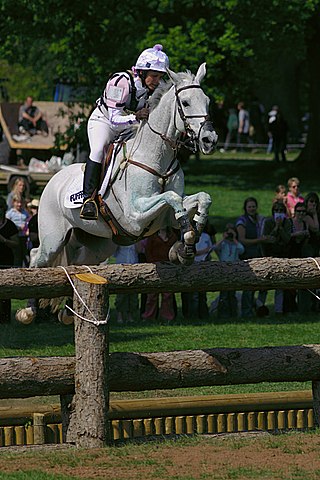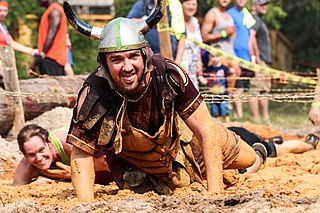
Athletics is a group of sporting events that involves competitive running, jumping and throwing. The most common types of athletics competitions are track and field, road running, cross-country running, and racewalking.

Eventing is an equestrian event where a single horse and rider combine and compete against other competitors across the three disciplines of dressage, cross-country, and show jumping. This event has its roots in a comprehensive cavalry test that required mastery of several types of riding. The competition may be run as a one-day event (ODE), where all three events are completed in one day or a three-day event (3DE), which is more commonly now run over four days, with dressage on the first two days, followed by cross-country the next day and then show jumping in reverse order on the final day. Eventing was previously known as Combined Training, and the name persists in many smaller organizations. The term "Combined Training" is sometimes confused with the term "Combined Test", which refers to a combination of just two of the phases, most commonly dressage and show jumping.

The modern pentathlon is an Olympic multisport that currently consists of fencing, freestyle swimming, equestrian show jumping, laser pistol shooting, and cross country running. Equestrian will be replaced by a form of obstacle course racing at the 2028 Summer Olympics.

Belarus competed in the Summer Olympic Games for the first time as an independent nation at the 1996 Summer Olympics in Atlanta, United States. Previously, Belarusian athletes competed for the Unified Team at the 1992 Summer Olympics. 157 competitors, 91 men and 66 women, took part in 115 events in 19 sports.
Equestrian competitions at the 1968 Summer Olympics in Mexico City, Mexico featured team and individual competitions in show jumping, eventing, and dressage. Mexico City proved a challenging site since it was 2,300 meters above sea level, resulting in 30% less oxygen in the air. The horses at the 1955 Pan American Games, which was also held in Mexico City, arrived a few weeks before the Games to adjust, but had difficulty in the competition. However, racehorses that competed at the same location and who were shipped in the day before, and left the day after the race, performed fine. It was discovered that although horses would adjust immediately to the high altitude during the first few days after arrival, they showed weakness and decreased performance around Day 10, which continued to Day 20. Therefore, nations were advised to ship in horses 3–4 weeks before the competition, which would allow them time to recover from the long travel, as well as adjust to the difference in altitude. Argentina, Ireland, and the USSR were the first to ship horses over, who arrived mid-September. France and Germany were the last countries to send their horses, who arrived 28 September 20 days before the competition was to start.
The equestrian events at the 1972 Summer Olympics in Munich included show jumping, dressage and eventing. All three disciplines had both individual and team competitions. The equestrian competitions were held at 3 sites: an existing equestrian facility at Riem for the individual show jumping and eventing competitions, the Olympic Stadium in Munich for the Nations Cup, and Nymphenburg, a Baroque palace garden, for the sold-out dressage. 179 entries, including 31 women, competed from 27 countries: Argentina, Australia, Austria, Belgium, Bolivia, Bulgaria, Brazil, Canada, Chile, Denmark, the German Democratic Republic (GDR), France, the Federal Republic of Germany (FRG), Great Britain, Hungary, Ireland, Italy, Japan, Mexico, the Netherlands, Poland, Portugal, the Soviet Union, Spain, Sweden, Switzerland, and the United States. The youngest participant was Kurt Maeder from Switzerland at 19 years old, while the oldest rider was Lorna Johnstone from Great Britain at 70 years old.

Equestrian sports were first included in the Olympic Games in the Summer Olympics of 1900 in Paris. They were again included in 1912, and have been included in every subsequent edition of the Games. Currently, the Olympic equestrian disciplines are dressage, eventing, and show jumping. In each discipline, both individual and team medals are awarded. Since the XV Olympiad in Helsinki in 1952, women and men compete on equal terms.

Canada, represented by the Canadian Olympic Committee (COC), competed at the 2008 Summer Olympics in Beijing, China, from August 8 to 24, 2008. Canadian athletes had competed in every Summer Olympic Games since 1900 with the exception of 1980, which were boycotted in protest of the Soviet invasion of Afghanistan. Canada sent 332 athletes in 25 sports, the seventh largest team at the games and Canada's largest since 1988. Canada did not send a team in handball, volleyball or basketball. Kayaker and 2004 Summer Olympics gold medalist Adam van Koeverden was the flag bearer at the opening ceremonies; Karen Cockburn bore the flag at the closing.

The individual eventing at the 2008 Summer Olympics took place between August 9 and 12 2008 at the Hong Kong Sports Institute.

Croatia competed at the 2012 Summer Olympics in London, United Kingdom, from 27 July to 12 August 2012. This was the nation's sixth consecutive appearance at the Summer Olympics.
The individual eventing event, part of the equestrian program at the 2000 Summer Olympics, was held from 20 to 22 September 2000 in the Sydney International Equestrian Centre. Like all other equestrian events, the eventing competition was mixed gender, with both male and female athletes competing in the same division.

Obstacle course racing (OCR) is a sport in which a competitor, traveling on foot, must overcome various physical challenges in the form of obstacles. Races vary in length from courses with obstacles close together to events of several kilometers which incorporate elements of track, road and/or cross country/trail running. Courses may include climbing over walls or up ropes, monkey bars, carrying heavy objects, traversing bodies of water or mud, crawling under barbed wire, and jumping through fire. Since the beginning of modern OCR in 1987, the sport has grown in popularity such that more than 2500 events are held annually across the world and several run organizing companies are commercially successful.
The individual eventing in equestrian at the 2012 Olympic Games in London was held at Greenwich Park from 28 to 31 July. Michael Jung of Germany won the gold medal. Sweden's Sara Algotsson Ostholt won silver and Sandra Auffarth, also of Germany, took bronze.
The equestrian events at the 2020 Summer Olympics in Tokyo featured three disciplines for both individual and team competitions.
The individual eventing event, part of the equestrian program at the 1996 Summer Olympics, was held from 23 to 26 July 1996 in the Georgia International Horse Park, in Conyers, Georgia. Like all other equestrian events, the eventing competition was mixed gender, with both male and female athletes competing in the same division.
The women's quadruple sculls competition at the 1984 Summer Olympics took place at Lake Casitas, California, United States.

World Obstacle, institutional name Fédération Internationale de Sports d’Obstacles(FISO), is the international governing body for obstacle sports and related events. Disciplines include Ninja and Obstacle Course Racing (OCR). Headquartered in Lausanne, Switzerland, it sanctions world and continental level events.

The individual eventing event at the 2020 Summer Olympics is scheduled to take place from 30 July to 2 August 2021 at the Baji Koen and Sea Forest Cross-Country Course. Like all other equestrian events, the eventing competition is open-gender, with both male and female athletes competing in the same division. 65 riders from 29 nations are expected to compete.
Obstacle racing was among the sports contested at the 2019 SEA Games. Six obstacle course racing events were featured: two events each for 100 meters with 10 obstacles, 400 meters with 12 obstacles and 5 km with 20 obstacles. These were the first obstacle course racing events in Games recognised by the International Olympic Committee and under regulation of World OCR, the Fédération Internationale de Sport d'Obstacles.
The equestrian events at the 2024 Summer Olympics in Paris were run from 27 July to 6 August at the Palace of Versailles, featuring 200 riders across three disciplines for both individual and team competitions, namely dressage, eventing, and jumping. Men and women compete together on equal terms.











